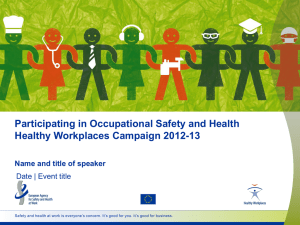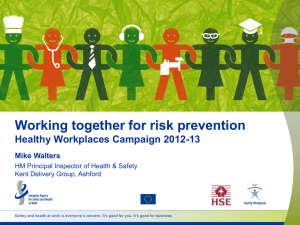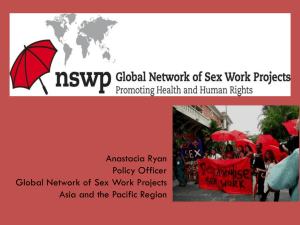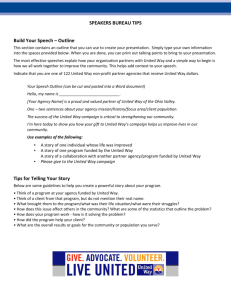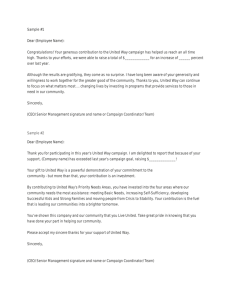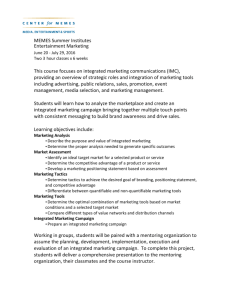Management Leadership in Occupational Safety and Health
advertisement
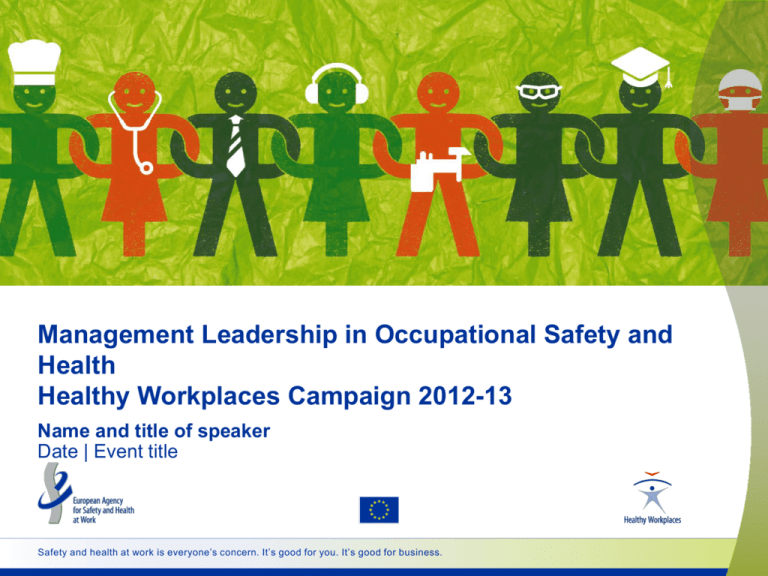
Management Leadership in Occupational Safety and Health Healthy Workplaces Campaign 2012-13 Name and title of speaker Date | Event title Safety and health at work is everyone’s concern. It’s good for you. It’s good for business. Scale of the problem Why is safety and health important? • Good for business, workers and for society as a whole • Every year more than 5,500 people lose their lives due to workplace accidents • 159,000 die as a result of work-related illnesses (ILO estimate) • € 490 billion cost to the EU economy www.healthy-workplaces.eu 2 Scale of the problem Most occupational accidents and illnesses are preventable • 1999–2007 the EU15 improved workplace safety (fatalities down from 5,275 to 3,782 and non-fatal accidents down by 900,000) • 2007–2012 Community strategy targets a further 25% reduction • This campaign aims to build on this success BUT • We need to continue making prevention efforts, because hard-won gains can easily be lost if we ‘relax’ www.healthy-workplaces.eu 3 Benefits of good safety and health • Reduced risks and costs − less sick leave and staff turnover − fewer accidents − lower insurance costs • Rise in productivity • Reduced threat of legal action • Better reputation among customers, suppliers and investors www.healthy-workplaces.eu 4 Prevention is better than cure Prevention is the cornerstone of Europe’s approach to managing risks • Reduced risks • Evaluating risks • Combating risks at source • Giving appropriate instructions to workers • Adapting workplace design and equipment to workers • Adapting to technical progress • Putting in place a coherent overall prevention policy • Prioritising protective measures for the whole workforce over those for individuals www.healthy-workplaces.eu 5 The role of the management Underlying management for enhancing safety and health • Effective and strong leadership • Active worker involvement • Ongoing assessment and review • Leadership goes hand in hand with participation • Without good leadership, participation will not succeed • Management is responsible for the prerequisite to establish partnership and participation www.healthy-workplaces.eu 6 First management principle: Leadership and safety and health (1) Effective and strong leadership in safety and health is vital. This means that management: • Commits itself to OSH as a core value of the organisation • Has an accurate picture of the organisation’s risk profile • Leads by example and demonstrates integrity • Clearly defines and monitors roles and responsibilities • Prioritises OSH in the company’s sustainability strategy and throughout the supply chain www.healthy-workplaces.eu 7 Leadership and safety and health (2) Practical examples of OSH leadership include: • Visiting workstations to consult staff about health and safety (workers may not only identify problems but may provide solutions too) • Taking personal responsibility and showing that you care • Leading by example • Making available, as far as possible, money and time www.healthy-workplaces.eu 8 Good practice example (1) Oil refinery, Belgium • The Total oil refinery in Antwerp brought in the contractors SPIE Belgium • This resulted in a clash of business and safety cultures that had to be sorted out • The companies resolved key organisational differences and then focused on employee behaviour on the shop floor • Corporate cultures were aligned by means of intense, though largely informal, consultation www.healthy-workplaces.eu 9 Good practice example (2) • The improvement resulted in zero accidents once Total and SPIE had agreed on “best practices” Success factors • Participation and skill of senior management • Open communication • Active involvement of employees www.healthy-workplaces.eu 10 Second management principle: Active worker involvement (1) • The employer is responsible for managing work-related risks, but EU law says that employers must consult their workers about health and safety • Some employers go beyond this legal obligation to create a real twoway communication process in which workers take part in health and safety decision-making www.healthy-workplaces.eu 11 Active worker involvement (2) • This creates a culture where relationships between employers and workers are based on collaboration, trust and joint problem-solving BUT • Direct worker participation should not be seen as an alternative to a system of workers’ representatives • They can both be used effectively, in line with national frameworks and the specific characteristics of the workplace www.healthy-workplaces.eu 12 Active worker involvement (3) Employee input is especially valuable during: • Risk analysis • Developing policies and interventions • Providing pertinent observations during training and implementation www.healthy-workplaces.eu 13 Active worker involvement (4) Benefits of active worker involvement include: • Lower accident rates • Cost-effective solutions • A happier and more productive workforce • Greater awareness and control of workplace risks www.healthy-workplaces.eu 14 Third management principle: Ongoing assessment and review (1) • Monitoring and reporting are vital tools for enhancing workplace safety and health • They can provide the company board with specific (e.g. incident-led) and routine reports on OSH performance • This can be useful in raising issues, highlighting problems and ultimately enhancing safety and health www.healthy-workplaces.eu 15 Third management principle: Ongoing assessment and review (2) A good assessment and review system should include: • Procedures to report major health and safety failures to board members and company owners as soon as possible • Systems to capture and report data such as accident and sickness rates • Arrangements to incorporate worker views and experiences • We help create safer and healthier workplaces for everyone’s benefit – but we cannot do this by ourselves www.healthy-workplaces.eu 16 Network-based campaigning Core strength: national focal points and tripartite networks But also … engage other stakeholders/partners • Official campaign partners (Pan-European and international organisations) including social partners, NGOs, sectoral federations and networks, private companies • EU institutions including European Commission, EU Parliament, EU representations, EU agencies, Enterprise Europe Network www.healthy-workplaces.eu 17 How to get involved? The campaign is open to all individuals and organisations. You can get involved by: • Disseminating campaign information and materials • Joining in with one of the many events, conferences, competitions, advertising campaigns – taking place during the campaign • Organising your own activities www.healthy-workplaces.eu 18 Campaign partnership offer Pan-European organisations can also apply to be campaign partners. The Agency offers: • Partner certificate • Welcome pack • Promotion at EU level and in the media • Online Communication Platform • Partner web section www.healthy-workplaces.eu 19 European Good Practice Awards • Recognise outstanding and innovative contributions • Encourage managers and workers to work together • Enhance workplace safety and health • EU Member States, EEA, Western Balkans and Turkey • Two categories: Workplaces employing fewer than 100 people Those with 100 or more workers • Winners chosen from entries submitted by national focal points http://osha.europa.eu/en/about/competitions www.healthy-workplaces.eu 20 Resources • Campaign guide • Practical guides for workers and managers • Good practice examples • News about campaign events • Presentations and animated video clips • All available in 24 languages www.healthy-workplaces.eu www.healthy-workplaces.eu 21 Key dates • Campaign launch 18 April 2012 • European Weeks for Safety and Health at Work October 2012 and 2013 • Good Practice Awards Ceremony April 2013 • Healthy Workplaces Summit November 2013 www.healthy-workplaces.eu 22 Further information • Visit the campaign website www.healthy-workplaces.eu • To find out about events and activities in your country, contact your national focal point www.healthy-workplaces.eu/fops www.healthy-workplaces.eu 23
